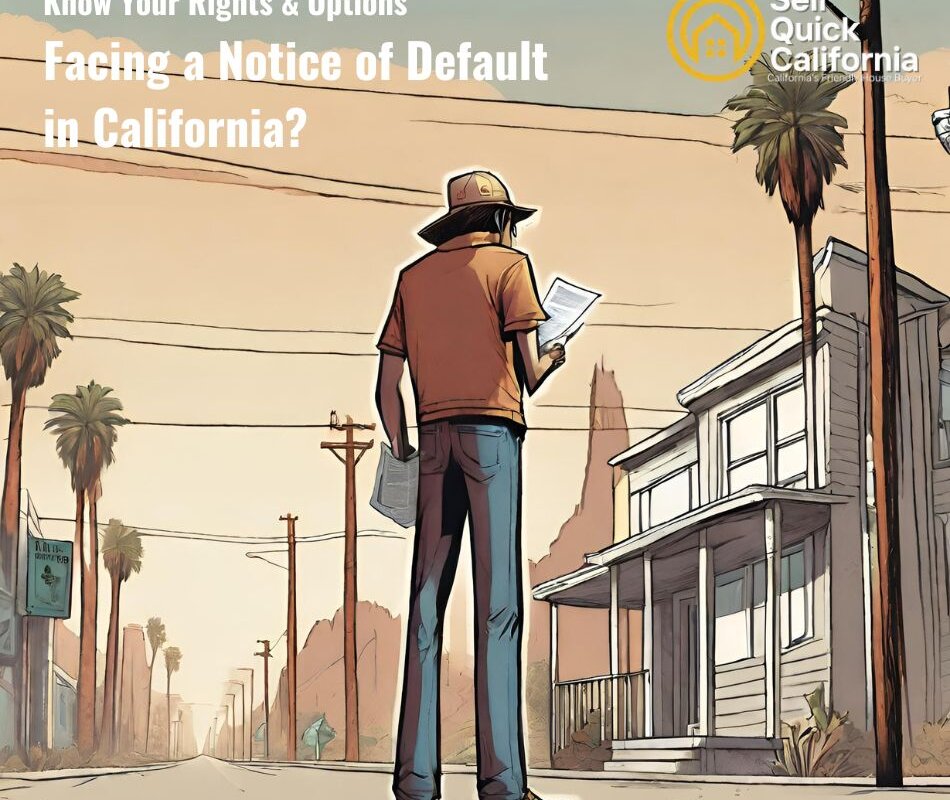Your lender has consistently been sending you reminders about your overdue mortgage payments and may have even cautioned you that a significant step was imminent. Despite the warnings, receiving a notice of default in your mailbox can still be a jarring experience. It officially confirms your financial difficulties. However, this isn’t the time to get bogged down in despair. It’s crucial to respond with clear-headed and decisive actions.
Firstly, it’s important to grasp what the notice of default in California signifies and explore the options available to you. That’s our starting point. Following that, we’ll provide you with strategies to potentially avoid foreclosure. We aim to guide you through resolving your mortgage issues with Sell Quick California in a straightforward and hassle-free manner.
What Does A Notice Of Default Mean In California?
When you receive a notice of default for your house in California, it signifies your lender’s official decision to proceed with foreclosure and potentially auction off your property. This document is recorded at the county recorder’s office, identifying you as the borrower and detailing the property you’ve mortgaged. It outlines the specifics of how you’ve failed to adhere to your loan agreement, including missed payments, the total amount due, and any additional claims your lender might have against you. From the filing date, you’re given 90 days to settle the full amount owed to halt further foreclosure proceedings.
However, if you’re currently facing a notice of default, it means we’re addressing your situation partway through its development. Several steps, governed by both state and federal laws, precede the issuance of a default notice. It’s essential to review these stages carefully, as any oversight, though rare, might afford you additional time or flexibility in dealing with your lender. Before receiving the notice of default in California, you would have encountered several regulated processes.
California Notice of Default: Essential Information and Timelines
You’re at least three payments and 120 days behind on your mortgage. Your lender has made direct contact with you, either in person or by telephone, at least 30 days prior to filing the notice of default. An opportunity for a follow-up meeting was offered within 14 days of the initial contact. You have been assigned a single point of contact at the lending institution—either an individual or a team—who is well-acquainted with your case and available for you to discuss your mortgage and options to avoid foreclosure. Additionally, you received a demand letter, also known as a breach letter, indicating the impending filing of a notice of default at least 30 days before its actual filing.
At this juncture, it’s likely that certain strategies didn’t pan out for you. You may have explored a forbearance agreement, which temporarily pauses or reduces your mortgage payments, or attempted to negotiate a loan modification for more favorable mortgage terms. These options typically rely on an improvement in your financial situation or the end of financial hardship, which may not apply to your circumstances.

Options Following Receipt of a California Notice of Default
The notice of default marks a formal progression in the California foreclosure process, potentially leading to your house being auctioned or sold. You will receive a notice of sale 90 days later, setting a date for the auction of your house. To avoid the foreclosure auction after the notice of default is filed, you have two alternatives:
- Deed-in-lieu of foreclosure allows the bank to take possession of your house in settlement of your mortgage debt, bypassing the auction. This option can save you in fees and penalties, but you lose your house and any equity it may have accrued.
- A short sale involves selling your house for less than the outstanding mortgage amount. Your lender might consent to this, considering the costs and delays associated with foreclosure. You’ll need to find a buyer and get the lender’s approval for the sale. If the sale price covers the mortgage debt, you don’t need the lender’s permission, and you’re more likely to preserve some equity by selling promptly, before the lender intervenes.
Real Estate Commission Rates
Selling your house traditionally involves numerous steps and expenses, which may be impractical for you currently. Preparing your house for sale—ensuring it’s in good condition, clean, maintained, and staged—is essential. Additionally, finding a real estate agent and negotiating commission rates takes time, which is a luxury you may not have. Under ideal conditions, this process can still be daunting, not to mention the other pressing issues you’re facing, including securing new housing. You don’t need the added stress. Fortunately, there’s an alternative.
Sell Your House Quickly After a Default Notice
It’s not too late to take action against the bank’s attempt to seize your home. You can sell your house directly to bypass complexities with your lender and the uncertainty of finding a buyer swiftly. Sell Quick California specializes in purchasing houses in foreclosure. We can extend a fair offer for your house typically within 48 hours, sparing you the effort and expense of preparing it for the market. There’s no need for repairs, as we buy houses as-is. Accepting our offer means receiving cash payment, usually within a week, allowing you to avoid the auction process and concentrate on overcoming other challenges.
If you’re prepared to address your financial situation and sell your house fast, reach out to Sell Quick California online or call us at (866) 497-8248

